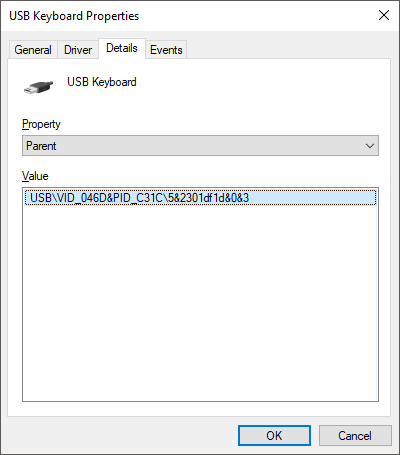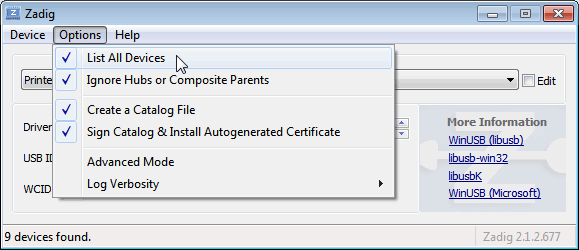As mgray mentioned, you should use the latest version of libusb-win32 (now it is 1.2.1.0), libusb-win32 kernel driver (libusb0.sys) is digital signed and can be installed under 64bit Windows Vista and Windows 7. So you just need to use the inf-wizard to generate a new driver package for your device. Download libusb 1.0.20 for Windows. Fast downloads of the latest free software! What's new in libusb 1.0.19: Add support for USB bulk streams on Linux and Mac OS X (#11) Windows: Add AMD and Intel USB-3.0 root hub support; Windows: Fix USB 3.0 speed detection on Windows 8 or later (#10). That replaces the AVRISP mkII driver with one that is incompatible with avrdude. Years ago, when it happened to me, the Atmel Studio (AVR Studio at that time) driver was called 'Jungo', but that might have changed. I believe the driver traditionally used with avrdude is libusb-win32, but I have been using the libusbK driver.
- 1Using flashrom on Windows
- 2Building flashrom on Windows using MinGW/MSYS.
- 2.1Requirements
Requirements
In order to use flashrom on Windows you must either build it from source as explained below or just download a snapshot from here.If your programmer is COM or LPT-based, there is nothing more to do, because Windows has all drivers needed.
It isn't so easy for USB-based devices, because they needed a special libusb-win32 driver, that must be generated and installed to make it available to the flashrom executable.Because the nature of the generation process, the driver has no digital signature and can't be installed on 64-bit Windows versions without some preparations.
Obtaining libusb-win32
The required installation file can be found on the libusb-win32 project site.Please use the same version that was used for flashrom compilation as indicated by the download path.
Download the file named libusb-win32-bin-x.y.z.t.zip and unpack /libusb-win32-bin-x.y.z.t/bin directory from it.
Making libusb-based driver for your device
- Attach your USB device and click on Cancel or Close on the Driver Installation Wizard window.
- Run inf-wizard.exe from the unpacked bin directory. Click on Next.
- Select your device from the list, click on Next.
- Do not alter Vendor ID, Product ID and MI. You can alter Manufacturer and Device names, if you want. Click on Next.

- Select the destination for the newly created driver and click on Save.
- If you are using 32bit Windows version or 64bit Windows version with unsigned driver installation option enabled, click on Install Now.. to install the driver.
- If you receive an error message instead of a successful driver installation, disable the enforced driver signing (your favorite search engine will give you details about that) and install the driver after that.
- Detach your device and attach it once again to finish the installation.
Using flashrom
After installing the drivers successfully you can use flashrom without Administrator privileges.Consult the man page about how to use it in general and the options available for your programmer.
Drivers frys laptops & desktops refurbished. Fry's was founded as a Silicon Valley retail electronics store in 1985 to provide a one-stop-shopping environment for the hi-tech professional. Company History.
Before you set up a MinGW/MSYS build environment, note that you may find usable Windows binaries in our buildbot archive. However, they are usually untested and not recommended to be trusted blindly.
Requirements
MinGW/MSYS
In order to build flashrom and various of its dependencies, we need a UNIX-like environment on Windows, which is provided by MinGW/MSYS.
- Download the latest version (20110530 currently) of the automated MinGW installer named mingw-get-inst (double-click the installer *.exe, which will download and install all components).
- Make sure you enable 'MinGW Compiler Suite', 'C++ compiler', 'MSYS Basic System', and 'MinGW Developer Toolkit' in the installer.
- For simplicity it's recommended to leave the default install location of c:MinGW unchanged.
Now open a MinGW shell via Start/Programs/MinGW/MinGW Shell and do the following:
- Additionally, pkg-config is needed. There are a few ways to do this. The MinGW FAQ has some suggestions: Extract the binary from GTK or use an alternative implementation. A flashrom user describes the steps for extracting pkg-config from GTK in this issue on Github.
If you are using MSYS2, pacman can also be used:
libusb-win32
- Download and execute libusb-win32-devel-filter-1.2.6.0.exe.
- Download and extract libusb-win32-bin-1.2.6.0.zip.
- Copy lusb0_usb.h to (the equivalent of) /usr/local/include.
libftdi
- Install libftdi. The easiest method is probably to use the libftdi-0.18_mingw32.zip binaries from here.
- Extract the ZIP file into a temporary directory.
- Copy dll/libftdi.dll to /usr/local/bin.
- Copy lib/libftdi.a and lib/libftdi.dll.a to /usr/local/lib.
- Copy include/ftdi.h to /usr/local/include.
Building flashrom
Checkout the flashrom source code (see the download page for instructions), then:
First you need to install MinGW (on Ubuntu it is enough to install the package mingw32).Of course all the normal build utilities are needed like make etc. (usually contained in a package named build-essential or similar).If you want to use libusb or libftdi you need to get the headers and static library files (*.a).The latter can either be downloaded pre-built or need to be (cross-)compiled.For libusb-win32 this even requires a Windows SDK which makes the whole point of cross-compiling a bit moot.See the respective source packages for documentation on how to cross-compile them.
The headers and libraries should be organized in a Unix-like directory layout, i.e. a (sub) directory named 'lib' containing the static libraries (*.a), 'bin' with non-static libraries (*.dll) if need be, and 'include' with the headers (*.h).
You can then compile flashrom.exe with
A relative path (originating in the flashrom directory) is allowed as LIBS_BASE's value.The compiler to be used (given by the CC value) depends on the MinGW edition you are using.
Released:
Python binding for the libusb C library.
Project description
Overview
libusb-1.0 API Reference
libusb uses the underlying libusb C shared library as specified inlibusb.cfg (included libusb-X.X.* is the default), but there is also abilityto specify it programmatically by one of the following ways:
About original libusb:
Borrowed from the original website:
libusb - A cross-platform user library to access USB devices
Overview
libusb is a C library that provides generic access to USB devices.It is intended to be used by developers to facilitate the production ofapplications that communicate with USB hardware.
It is portable: Using a single cross-platform API, it provides accessto USB devices on Linux, OS X, Windows, Android, OpenBSD, etc.
It is user-mode: No special privilege or elevation is required for theapplication to communicate with a device.
It is version-agnostic: All versions of the USB protocol, from 1.0 to 3.1(latest), are supported.
What platforms are supported?
Linux, OS X, Windows, Windows CE, Android, OpenBSD/NetBSD, Haiku.
For additional information, please consult theFAQor theWiki.
Requirements
- All necessary things are installed during the normal installation process.
ATTENTION: currently works and tested only for Windows.
Installation
Prerequisites:
- Python 3.6 or higher
- 3.7 with C libusb 1.0.22 is a primary test environment.
- pip and setuptools
To install run:
Development
Prerequisites:
Development is strictly based on tox. To install it run:

Visit development page.
Installation from sources:
clone the sources:
and run:
or on development mode:
License
Changelog
1.0.23b7 (2020-11-19)
- Ability to specify the underlying shared library programmatically.
- General update and cleanup.
- Setup update.
- Removing dependence on atpublic.
- Fixed docs setup.
- Fix for hotplugtest example.
1.0.23b1 (2020-09-15)
- (partially; without libusb_wrap_sys_device, becauseoriginal Windows dlls do not export this function).
Add support for Python 3.9.
Drop support for Python 3.5.
Setup update.
Cleanup.
1.0.22b9 (2020-01-17)
- Added ReadTheDocs config file.
- Setup update.
1.0.22b8 (2019-11-24)
- Upgrade for Linux: libusb x64 v.1.0.21 -> v.1.0.22
- Fix for error when the shared library is configured.
- Cleanup.
1.0.22b6 (2019-11-23)
- Initial support for Linux (libusb v.1.0.21 x64).
1.0.22b5 (2019-11-14)
- Drop support for Python 2.
- Drop support for Python 3.4.
- Add support for Python 3.8.
- Setup update and cleanup.
1.0.22b4 (2019-02-15)
- Setup improvement.
- Update required setuptools version.
- Some updates of examples.
1.0.22b2 (2018-11-08)
- Setup improvement.
- Update required setuptools version.
Libusb 1.0 Driver Download For Windows 10 Pro
1.0.22b1 (2018-03-30)
- Upgrade to the libusb v.1.0.22
- Setup improvement.
Libusb 1.0 Driver Download For Windows 100
1.0.21b4 (2018-02-26)
- Improve and simplify setup and packaging.
1.0.21b2 (2017-12-18)
- Fix the error of platform detecting.
1.0.21a3 (2017-08-20)
- Next alpha release.
0.0.1 (2016-09-23)
- Initial release.

Release historyRelease notifications | RSS feed
Roche Diagnostics Port Devices Driver Download for windows. 1.0.23b7 pre-release

1.0.23b6 pre-release
1.0.23b5 pre-release
1.0.23b3 pre-release Mediatek driver download.
1.0.23b2 pre-release
1.0.23b1 pre-release
1.0.22b9 pre-release
1.0.22b8 pre-release
Libusb 1.0 Driver Download For Windows 10 32-bit
1.0.22b5 pre-release
1.0.22b4 pre-release
1.0.22b2 pre-release
Download files
Download the file for your platform. If you're not sure which to choose, learn more about installing packages.
| Filename, size | File type | Python version | Upload date | Hashes |
|---|---|---|---|---|
| Filename, size libusb-1.0.23b7.zip (251.8 kB) | File type Source | Python version None | Upload date | Hashes |
Libusb 1.0 Driver Download For Windows 101
CloseHashes for libusb-1.0.23b7.zip
Libusb Install Windows 10
| Algorithm | Hash digest |
|---|---|
| SHA256 | dbc6622f1e9145b1cbb7a397c68ccfe04cdb65a5d3475c56d689390008ade394 |
| MD5 | be8d43f0d4d973c5dd46a84dd9cf5940 |
| BLAKE2-256 | bf95f8e4eb37bd8ce02aff9dba1cff8823498f18366866ab769ced916ce68315 |
